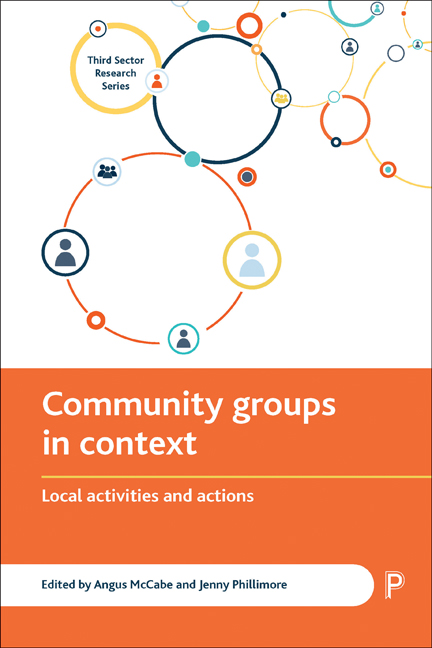Book contents
- Frontmatter
- Contents
- List of tables and figures
- Foreword
- Series editor’s foreword
- Acknowledgements
- Notes on contributors
- Introduction Why get below the radar? The importance of understanding community groups and activities
- Part One Scoping and mapping community actions and activities
- Part Two Community groups and activities in context
- Part Three Under-explored radars
- Part Four Thinking about voice, learning and emotion below the radar
- Index
thirteen - Authentic and legitimate? The emotional role of ‘grassroots’ community activists in policymaking
Published online by Cambridge University Press: 05 April 2022
- Frontmatter
- Contents
- List of tables and figures
- Foreword
- Series editor’s foreword
- Acknowledgements
- Notes on contributors
- Introduction Why get below the radar? The importance of understanding community groups and activities
- Part One Scoping and mapping community actions and activities
- Part Two Community groups and activities in context
- Part Three Under-explored radars
- Part Four Thinking about voice, learning and emotion below the radar
- Index
Summary
Chapter aims
This chapter aims to:
• provide some conceptual and methodological tools for thinking about emotion in policymaking in general, and in particular the emotional aspect of ‘activism’ in political spaces;
• outline the findings of an ethnographic research project that looked at emotion in policymaking and the way ‘grassroots’ and ‘activist’ participants described their own relationship to emotion. The chapter then compares these understandings with others’ description of emotion and activism in this context;
• suggest some ways of thinking about what kind of emotion work is being done by activists (and others) and how policy professionals and unpaid participants might acknowledge and incorporate this work into their wider roles.
Researching and understanding emotion in policymaking
This chapter draws on an ethnographic research project that formed the basis of a doctoral thesis in politics. I set out with a very broad and fundamental research problem to investigate what people who make policy are referring to when they talk about emotion in their working lives. I had been a policy officer in non-governmental organisations (NGOs) for several years prior to beginning my thesis, and this question was drawn from my own experience trying – and failing – to account for the place of the relational and the ‘emotional’ in making policy decisions. As this chapter will explain, understandings and practices around activism, particular claims about knowledge and moral agency and the idea of the ‘emotional’ were closely tied together in the context of the policy processes my research describes, at least according to the people who participated in that work.
Ethnography that takes place within a culture or sub-culture the researcher is familiar with or identifies with relies heavily on the researcher's capacity for acting as a ‘professional stranger’, and there have not been too many insider ethnographic accounts of policymaking and policymakers. It might be said that there is a fundamental incompatibility between ethnographic inquiry and the knowledge claims of states and their bureaucracies: ‘It is a kind of cosmopolitan claim: to stand above the specifics of one's institution and social context. Ethnography erodes that claim’ (Kuus, 2013, p 54). Acting as a ‘professional stranger’ (Agar, 1996) is not only difficult for the researcher, but is also challenging to the researcher's informants. However, this perhaps underestimates how well ‘we’ (modern Western policymakers) know ourselves, how much we are actually strangers to ourselves in many ways, and how willing people are to explore this.
- Type
- Chapter
- Information
- Community Groups in ContextLocal Activities and Actions, pp. 263 - 280Publisher: Bristol University PressPrint publication year: 2017

